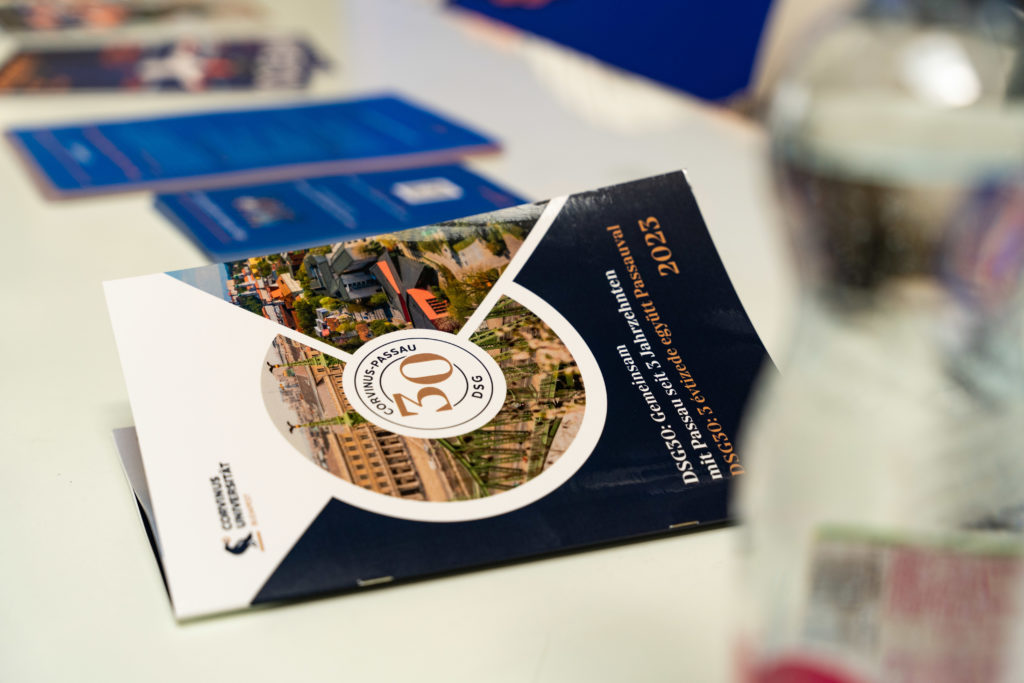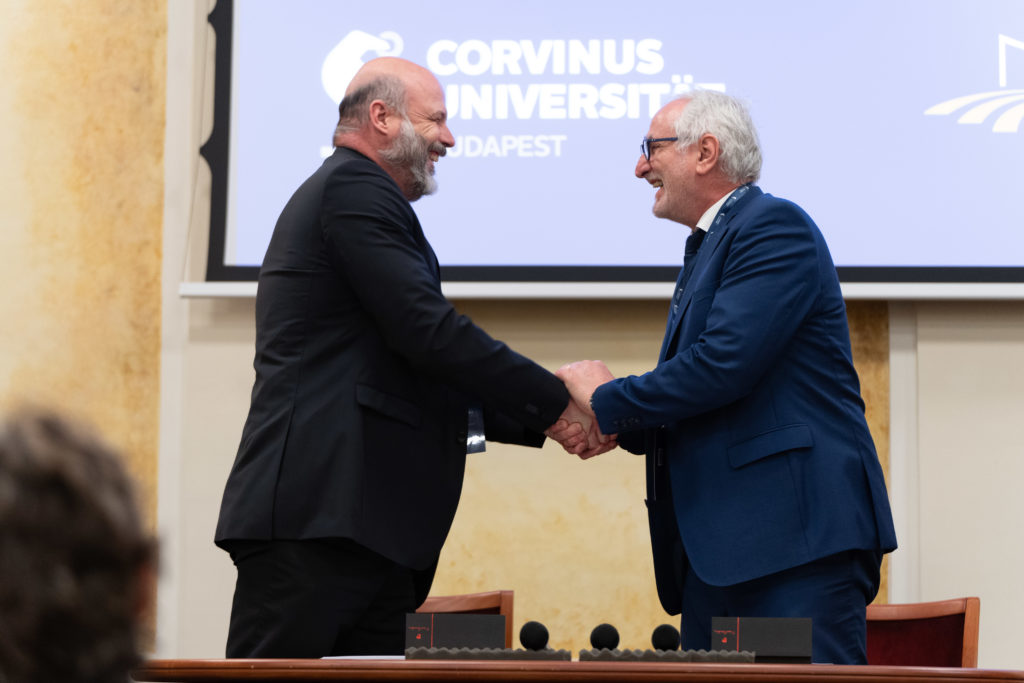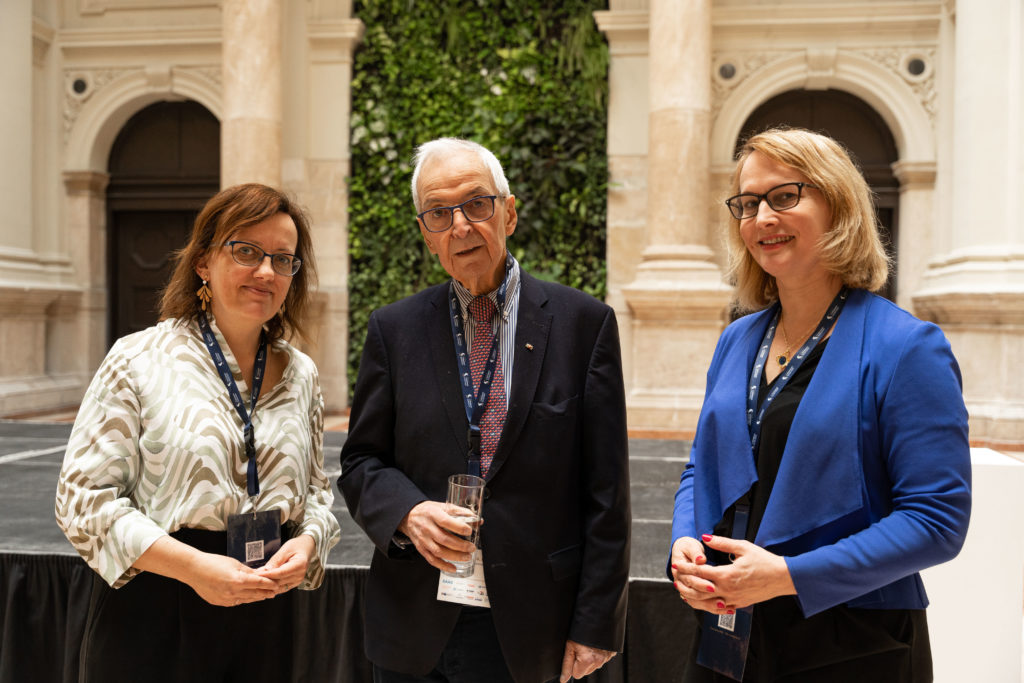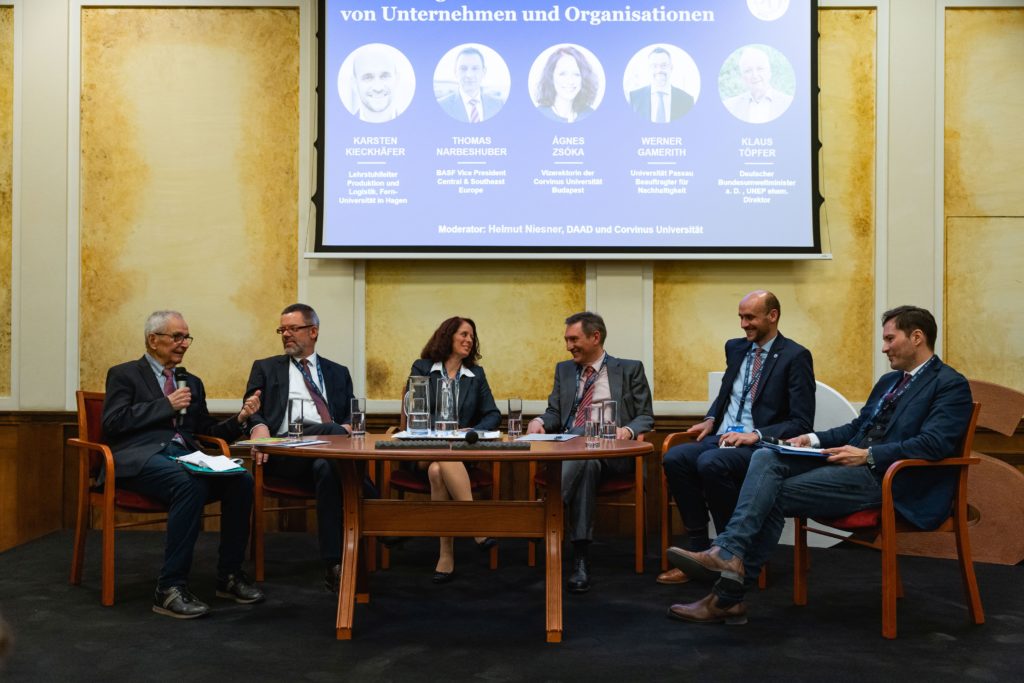More than 800 students have already completed the German-language programme in economics under a cooperation between Corvinus and the University of Passau

As a result of an extension of the agreement on a double-degree programme between the two higher education institutions, students from the University of Passau are now received by three master’s degree programmes – MSc Management and Leadership, MSc Marketing, and MSc Supply Chain Management – at Corvinus. The document was signed by Előd Takáts, Rector of Corvinus, and Ulrich Bartosch, President of the University of Passau on 19th April 2023, at an event organised by the German-language Business Training Centre (DSG – Deutschsprachiger Studiengang) of Corvinus University of Budapest to celebrate the anniversary.
Mutually advantageous inter-university cooperation in business and management sciences
At the event, Előd Takáts, Rector of Corvinus University, highlighted in his opening remarks: the programme is of great importance in the life of Corvinus, because it has truly manifested that borders can be crossed, and a great international community has been formed. As a result of the programme, economists have graduated from Corvinus University who not only have an excellent command of German, but are also able to fill professional or managerial positions in a corporate environment, thus fostering German-Hungarian economic relations. He thanked the staff working in the programme, expressing his hope that the initiative would continue to operate for at least another 30 years.
Ulrich Bartosch, President of the University of Passau, emphasised that it was a great honour for him that the Universities could celebrate together. Although the two organisations have different backgrounds, it is symbolic that they are linked also by a common river, the Danube. He added: there is no greater responsibility than to look after programmes.
Loretta Huszák, Head of DSG, explained: established exactly 30 years ago and having a close cooperation with the University of Passau ever since that time, DSG has offered, on the one hand, supplementary knowledge leading to a certificate – a specialisation initially, and a programme since 2021 –, as well as an independent specialisation as part of undergraduate programmes and, on the other hand, elective courses and a double-degree master’s programme as part of the programmes operated by the two institutions. So far more than 800 students have received a supplementary degree or a double-degree. From the two Universities, a total of nearly 70 students have participated in the double-degree programme available since 2003, for 20 years now, and 37 of them have come from the University of Passau. Participants of the programme spend half of their studies (two – consecutive or separate – semesters) at Corvinus, and the other half (two consecutive semesters) at the University of Passau, and then they receive a master’s degree from both Universities.
A degree in economics from DSG provides considerable advantage for having careers with companies whose working language is German
Having German-language professional knowledge represents an advantage for students of Corvinus, as Austria and Germany are the two largest economic partners of Hungary, and the Faculty of Business and Management Sciences of the University of Passau is ranked among the top 201-250 programmes across the world. Having a double-degree from Corvinus is attractive for students from the University of Passau because, at Corvinus, they not only may take general courses in economics but they may specialize, and they may also take courses in social sciences so as to broaden their knowledge.
The main sponsor of the DSG-programme is the German Academic Exchange Service (DAAD), which uses funds from the German Ministry of Foreign Affairs to provide support for operating costs and to fund reasonable scholarships, not only to students but also lecturers and researchers, for their stay in Passau or Budapest. In his remarks, Joybrato Mukherjee, President of DAAD, explained that DSG is an important partner of theirs, and became one the first beneficiaries of the organisation after the change of regime in 1989-90, and it is special that it has received support for such a long time, and it may be used as a best practice example for other initiatives. At the event, seven German-Hungarian companies were present, which have a close cooperation with DSG, among others, by offering personal consultation sessions to students attending DSG programmes: BASF, SAP Labs, Leitner&Leitner, KPMG, Merkbau, Audi és IFUA.
At the event, Csaba Burger, Head of the DSG Alumni Network of Corvinus, reported on the results of a survey about career paths of DSG Alumni conducted to find out where a degree from DSG is helpful. The survey has some main lessons, such as the fact that a degree from DSG may greatly support employment in fields of economics with Hungarian-German, Austrian, and Swiss companies. Many former DSG students work in senior positions at companies such as Spar, Siemens, KPMG, and Magyar Nemzeti Bank. In addition, DSG students are becoming more and more courageous when it comes to starting a company. According to 98% of DSG Alumni, the programme is useful and should definitely be continued; 81% of them decided to join the programme in order to improve their German language command; and according to 74% of them, they have been, and are being, well able to apply the professional knowledge acquired here.
German-Hungarian professional discussion on the relationship between sustainability and economy
On the occasion of DSG’s anniversary, the organizers put together a high-quality professional programme about the topic of sustainability and economy. The key-note speech was delivered by Professor Klaus Töpfer, former Federal Minister for the Environment of Germany and former executive director of the United Nations Environment Programme (UNEP). The speaker explained that we should switch over from a linear to a circular economy, where manufacturers are responsible for the entire life cycle of products. He stated: ecological and social considerations should also be taken into account alongside considerations of economic efficiency, and environmental resources should not be considered as free of charge.
The programme also included a round-table discussion involving German and Hungarian academic experts and, in addition, Mr. Thomas Narbeshuber, Regional Manager of the Central and Eastern Europe Region of BASF, the German group present in the chemical industry. The participants agreed that we are responsible for the well-being of future generations, we need to learn that we don’t always need to grow, and we need to think about what is really enough. In order for sustainability to take effect, the entire society must be made aware that changes are necessary: not only in the management of companies and among consumers, but also for all stakeholders. It was explained: long-term thinking is essential, and under the rule of law, it is not restrictions that should be applied, but limitations, within which the necessary solutions must be found by applying creativity.
The event was also one of the programmes of the German Language Week, the Wunderbar Festival, which was organized in April by the German, Austrian and Swiss embassies, in cooperation with the Goethe Institute, the Austrian Cultural Forum and the Austrian Institute; the event was joined by Corvinus and, in addition, many other Hungarian universities to promote German culture, economy, education and academic life.



Fotók: Takács Dániel, Corvinus Egyetem